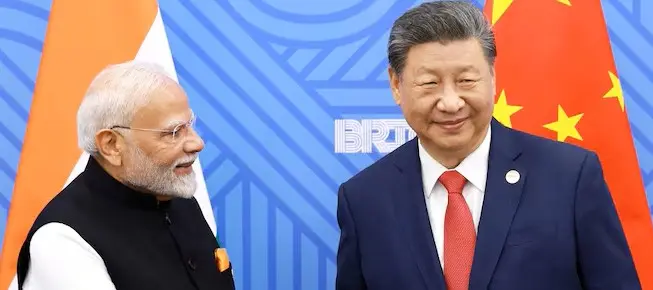
The SCO summit becomes a stage for symbolic gestures amid deep-rooted mistrust and geopolitical recalibration
1. A Welcome Wrapped in Skepticism
Modi China Visit Sparks Fierce Backlash in Beijing – Prime Minister Narendra Modi’s anticipated visit to China for the Shanghai Cooperation Organization (SCO) summit has stirred a flurry of commentary among Chinese foreign affairs analysts. While Beijing officially welcomed the visit with optimism, highlighting the potential for renewed cooperation, many voices within China’s strategic community responded with caution, even criticism.
State-run media outlets like the Global Times emphasized areas of mutual interest and downplayed Western narratives that framed Modi’s visit as a manoeuvre against U.S. influence. Yet beneath the surface, Chinese analysts questioned India’s intentions, viewing the visit as part of a broader pattern of strategic hedging. The phrase “to have the cake and eat it too” was used to describe India’s dual-track diplomacy engaging China while maintaining strong ties with the U.S..
This scepticism is rooted in a long-standing distrust of India’s foreign policy posture, which Chinese scholars often interpret as non-committal and opportunistic. The visit, while diplomatically significant, is seen by many in Beijing as a tactical move rather than a genuine pivot toward deeper bilateral engagement.
2. Strategic Balancing or Diplomatic Tightrope?
At the heart of Chinese criticism lies a fundamental question: Is India truly seeking rapprochement with China, or is it merely recalibrating its position amid shifting global dynamics?
Chinese analysts argue that India’s foreign policy has long oscillated between autonomy and alignment. During the Cold War, India’s non-alignment was viewed with suspicion in Beijing, and today, its growing defense cooperation with the U.S. including participation in the Quad and joint military exercises, fuels concerns about India’s reliability as a partner.
The timing of Modi’s visit is particularly telling. With India-U.S. trade relations facing turbulence and global negotiations over Ukraine potentially affecting India’s oil imports from Russia, some Chinese scholars see the SCO summit as a platform for India to rebalance its diplomatic posture. However, they remain unconvinced that Modi will make any substantial shift away from Washington.
Wang Yiwei, a prominent Chinese international relations scholar, even accused New Delhi of violating Western sanctions on Russia, contrasting India’s economic behaviour with China’s more cautious approach. This underscores the perception that India’s actions are driven by short-term strategic gains rather than long-term commitments.
3. SCO as a Stage for Symbolism, Not Substance
Despite the thaw in relations, evidenced by summarized direct flights and visa issuance, Chinese analysts remain sceptical about the tangible outcomes of Modi’s visit. They point to India’s limited participation in SCO activities, noting that Modi has attended only three of the last ten leaders’ meetings. Moreover, India’s refusal to sign a joint SCO statement condemning Pakistan for terrorism continues to be a sore point.
This pattern reinforces the belief that India uses multilateral forums like the SCO to maintain visibility and strategic autonomy without fully committing to the bloc’s agenda. For China, which views the SCO as a counterweight to Western alliances, India’s ambivalence is both frustrating and destabilizing.
Some analysts even question whether Modi will hold a bilateral summit with President Xi Jinping on the sidelines of the SCO, suggesting that such a meeting would be more symbolic than substantive. The lack of clarity around this potential engagement adds to the perception that India is playing both sides, engaging with China while keeping its options open with the West.
4. The Trust Deficit: A Barrier to Real Progress
Ultimately, the critical reaction from Chinese foreign affairs analysts reflects a deeper trust deficit that continues to plague India-China relations. This mistrust is not just about current geopolitical manoeuvring, it’s historical, ideological, and deeply embedded in the strategic psyche of both nations.
Chinese scholars frequently cite India’s economic liberalization and deepening ties with the U.S. as evidence of its Western tilt. Even as India seeks to re-energize its role in the SCO and engage with China on regional issues, its stance on matters like the South China Sea and its military cooperation with the U.S. complicated efforts to build trust.
From Beijing’s perspective, Modi’s visit is a calculated geopolitical move rather than a genuine outreach. It’s a way for India to strengthen its negotiating position with the U.S., manage its energy interests with Russia, and maintain a foothold in Asian multilateralism, all without making binding commitments to China.
In this context, the critical reaction from Chinese analysts is less about hostility and more about strategic realism. They see India’s diplomacy as a balancing act, one that may serve New Delhi’s interests but leaves Beijing wary of embracing Modi’s overtures without clear signals of intent.
Also read – India’s Bold Stand at SCO: Refuses to Endorse Communique That Ignores Terrorism Truths
Stay updated with latest updated news blogs on Rapido Updates.